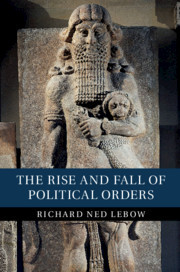Description
The Rise and Fall of Political Orders
Author: Lebow Richard Ned
Presents a new theory of the rise, evolution, decline, and collapse of political orders, exploring the impact of late-modernity upon the survival of democratic and authoritarian regimes.
Language: English
Subject for The Rise and Fall of Political Orders:
Approximative price 92.80 €
In Print (Delivery period: 14 days).
Add to cart
The Rise and Fall of Political Orders
Publication date: 09-2018
Support: Print on demand
Publication date: 09-2018
Support: Print on demand
Approximative price 32.87 €
In Print (Delivery period: 14 days).
Add to cart
The Rise and Fall of Political Orders
Publication date: 09-2018
444 p. · 15.3x22.7 cm · Paperback
Publication date: 09-2018
444 p. · 15.3x22.7 cm · Paperback
Description
/li>Contents
/li>Biography
/li>
Drawing on political theory, comparative politics, international relations, psychology and classics, Ned Lebow offers insights into why social and political orders form, how they evolve, and why and how they decline. Following The Tragic Vision of Politics and A Cultural Theory of International Relations, this book thus completes Lebow's trilogy with an original theory of political order. He identifies long- and short-term threats to political order that are associated respectively with shifts in the relative appeal of principles of justice and lack of self-restraint by elites. Two chapters explore the consequences of late-modernity for democracy in the United States, and another chapter, co-authored with Martin Dimitrov, the consequences for authoritarianism in China. The Rise and Fall of Political Orders forges new links between political theory and political science via the explicit connection it makes between normative goals and empirical research.
1. Political order; 2. Justice, solidarity, and order; 3. Why do order form?; 4. Why do order breakdown? 5. The United States: self-interest; 6. The United States: fairness vs. equality; 7. Britain; 8. China with Martin Dimitrov; 9. Conclusions.
Richard Ned Lebow is Professor of International Political Theory in the Department of War Studies, King's College London and Bye-Fellow of Pembroke College, University of Cambridge. He has authored, co-authored, or edited 34 books and over 250 peer reviewed articles and chapters. He has made contributions to the fields of international relations, political psychology, history, political theory, philosophy of science and classics.
© 2024 LAVOISIER S.A.S.




